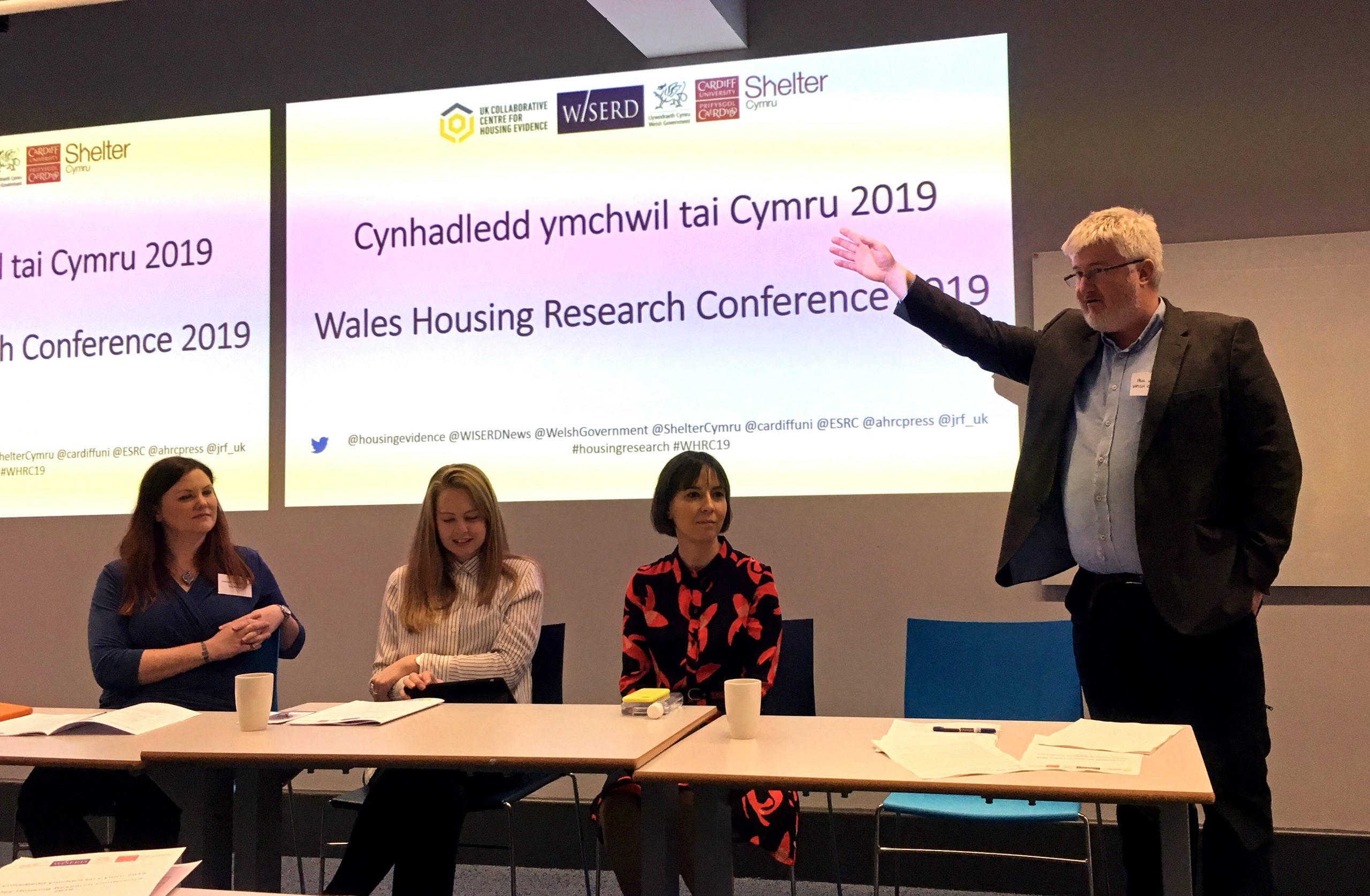Over 100 delegates attended the Wales Housing Research Conference 2019 at Cardiff University, co-hosted by WISERD’s Wales Housing Research Network, the UK Collaborative Centre for Housing Evidence (CaCHE), Shelter Cymru and the Welsh Government.
L-R: Lindsay Cordery-Bruce, Chief Executive of homeless charity, The Wallich; Dr. Sarah Payne from the University of Sheffield and the UK Collaborative Centre for Housing Evidence (CaCHE); Lígia Teixera from the Centre for Homelessness Impact; Paul Webb, Head of Welfare and Supported Housing at Welsh Government.
Over 100 delegates attended the Wales Housing Research Conference 2019 at Cardiff University, co-hosted by WISERD’s Wales Housing Research Network, the UK Collaborative Centre for Housing Evidence (CaCHE), Shelter Cymru and the Welsh Government.
It’s the start of a new year, and housing and homelessness are high on the political agenda in Wales. Bringing together a diverse group of housing professionals, third sector representatives and researchers, the conference provided a valuable opportunity to share research and evaluations on contemporary Welsh housing issues, providing a platform for reflection and knowledge exchange.
A varied line-up of expert speakers emphasised the challenges involved in dealing with a broad scope of housing concerns, including homelessness, housing conditions and health implications, legislative housing issues, housing supply and public attitudes towards housing provision.
The conference was opened by Paul Webb, Head of Welfare and Supported Housing at Welsh Government, who went on to welcome the day’s plenary speakers: Lígia Teixera from the Centre for Homelessness Impact; Lindsay Cordery-Bruce from homeless charity, The Wallich; Dr. Sarah Payne from the University of Sheffield and the UK Collaborative Centre for Housing Evidence (CaCHE); Lisa Mckenzie from Middlesex University and housing researcher, Tamsin Stirling.
Lígia Teixera’s presentation highlighted the need to recognise where there are gaps in our evidence and to ensure this doesn’t lead to bad decision-making and misplaced support for those in need of help. She said: “Decisions we make are often based on the data we can easily get. You have to take into account all data you cannot immediately see”.
She further emphasised the need for reliable evidence on homelessness interventions, rigorous testing of what works and what doesn’t, and the ability to prioritise and target research investments if we are to affect change.
Last year there was a 64% increase in demand for services from The Wallich. In the second talk of the morning, Lindsay Cordery-Bruce, the organisation’s Chief Executive, highlighted the sobering statistics coming out of The Wallich’s forthcoming South Wales Street Based Lifestyle Monitor, and pointed to “a crisis of leadership” on homelessness.
Lindsay Cordery-Bruce said: “We are seeing unprecedented levels of rough sleeping and need to do something unprecedented to sort it”. Lindsay also explored the ‘shifting environment’ of the housing sector, which provided useful context for the rest of the day’s presentations.
Dr Sarah Payne went on to provide delegates with an insight into her CaCHE research reviewing the existing evidence on how speculative housebuilders acquire, process and build out housing land. Sarah’s presentation highlighted that an industry focused on financially competitive land acquisition cannot also be customer-focused.
This notion of housing as a commodity rather than being people’s homes was set to become a recurrent theme of the day, and one that housing researcher, Tamsin Stirling, described as the fundamental problem to address, in the final plenary session of the day. Tamsin also addressed equality and fairness, highlighting the need for housing to combat, rather than compound poverty.
The afternoon also saw a plenary from Dr Lisa Mckenzie from Middlesex University. Lisa’s work builds upon the narratives of working class communities collected through political ethnographic research. In her presentation, she articulated the frustration felt by many housing practitioners in attendance, and called for people to stop talking about research and start talking about the action we must take to tackle homelessness and poor housing.
Within the context of a shifting environment, which presents challenges and obstacles to tackling housing issues, the overriding theme that emerged throughout the day was that of the need to work collaboratively and to use available evidence about both policy and practice. Speakers emphasied that political leaders and communities must work together with an approach that is both strategic and truly people-focused to really affect change.
Dr Pete Mackie, Chair of WISERD’s Housing Research Network and Coordinator of the Welsh hub of the UK Collaborative Centre for Housing Evidence (CaCHE), said: “This event brought together such a diverse group of delegates from different backgrounds and areas of expertise to share knowledge and practical resources. It demonstrated that not only is there an appetite for good evidence to inform better policy, but also a strong desire from all corners of our communities to work together, by putting theory into practice to effectively tackle key housing issues.”

